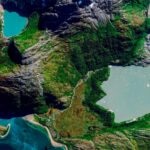BBVA, first Spanish bank to join TNFD, the Task Force on Nature-related Financial Disclosures
BBVA joins the global initiative the Task Force on Nature-related Financial Disclosures (TNFD) Forum. BBVA is the first Spanish bank to join thisworking group, which already includes more than 400 entities, organizations orregulators around the world.

The TNFD (Taskforce on Nature-related Financial Disclosures) is tasked with developing aframework for companies around the world to report and act on their evolving nature-related impacts, dependencies, risks and opportunities, with the ultimate goal of supporting a shift inglobal financial flows.
Better information will enable financial institutions and companies to incorporate nature-related risks and opportunities into their strategic planning, risk management and asset allocation decisions.
Javier Rodríguez Soler, Global Head of Sustainability at BBVA, explains, "by joining this initiative we continue to be at the forefront, doing our part and learning alongside otherbanks. We aim to promote the gradual integration of the impact of companies on natural capital and biodiversity. Furthermore, as a bank, our goal is to help finance projects that preserve and restore natural environments".
In the Global Risks 2021 Report, the World Economic Forum ranked biodiversity loss and ecosystem destruction as one of the top five threats facing humanity in the next decade. Society and the economy are critically dependent on biodiversity: $44 trillion (more than halfof the world's total annual GDP) depends heavily on the natural environment and there sources and services it provides. Action for nature-positive transitions could generate up to US$10.1 trillion in annual business value by 2030. Environmental degradation affects a majority of businesses through its impact on operations, supply chains and markets.

In March 2022, the TNFD released the first beta version of the framework and moved it to the market for consultation. This release marks the beginning of an 18-month process of consultation and development with a wide range of stakeholders and interested parties (investors, regulators, supervisors, etc). Three further iterations of the beta versions are planned before the release of the final version in Q3 2023.
This TNFD framework is expected to be the benchmark for biodiversity in the newsustainability reporting standards that are being developed both at European level with the EFRAG (European Financial Reporting Advisory Group) and globally with the ISSB(International Standards Sustainability Board).
Other banks that are part of the TNFD Forum include the Bank of America, Banorte, Barclays, BNP Paribas, Citi, Goldman Sach, HSBC, ING, Intesa San Paolo, JP Morgan Chase, Lloyds, MUFG, Natixis, Natwest, Nordea, Rabobank, Société Générale, Standard Chartered, Sumitomo Mitsui Financial Group and UBS.
TNFD is not developing a new standard, but rather an integrated framework similar to the TCFD—a standard that BBVA has been publishing since 2020—on climate; which builds on existing standards, metrics and data. G7 Finance Ministers and G20 and G7 Environment and Climate Ministers; as well as other individual leaders such as Mark Carney, UN Special Envoy for Climate Action; UN Secretary-General António Guterres; FrenchPresident Emmanuel Macron; and UK Prime Minister Boris Johnson have already endorsedthe initiative.
The TNFD adheres to the four disclosure pillars of the TCFD: governance; strategy; riskmanagement; metrics and objectives. By aligning the disclosures recommended by theTNFD closely with those of the TCFD, it seeks to facilitate and encourage progress towardsintegrated disclosures.
The framework is being developed "to be market-ready, science-based, government-supported, integrated and adaptive, globally inclusive, and take a comprehensive approach to nature-related risks, using an integrated approach to address climate and biodiversity-related risks", states the first version of the document.
For BBVA, with its major presence in emerging countries, biodiversity and natural capital are increasingly important in relationships with clients. The bank's approach is to strongly support clients in their transition to a greener and more inclusive future.
Given the importance to BBVA's loan portfolio and the dependence on water resources in the Power Generation sector, the Group has built a first framework for conducting detailed water stress risk assessments at the customer level. This assessment was carried out using the locations of its customer's power generation plants, the Aqueduct Water Risk Atlas tool of the World Resources Institute (WRI), which identifies water risk at asset locations as of today and in the future using a "business as usual" scenario (SSP2 RCP8.5),and the ENCORE (Exploring Natural Capital Opportunities, Risks and Exposure) tool developed by the Natural Capital Finance Alliance, which details water impacts and dependencies. The results of the assessment are a water stress risk scorecard of the customer and of the assets. The results of this assessment lead to the conclusion that water is a key parameter when assessing the credit risk of customers, considering that their activity may be negatively affected by the physical effects of climate change in the coming years.